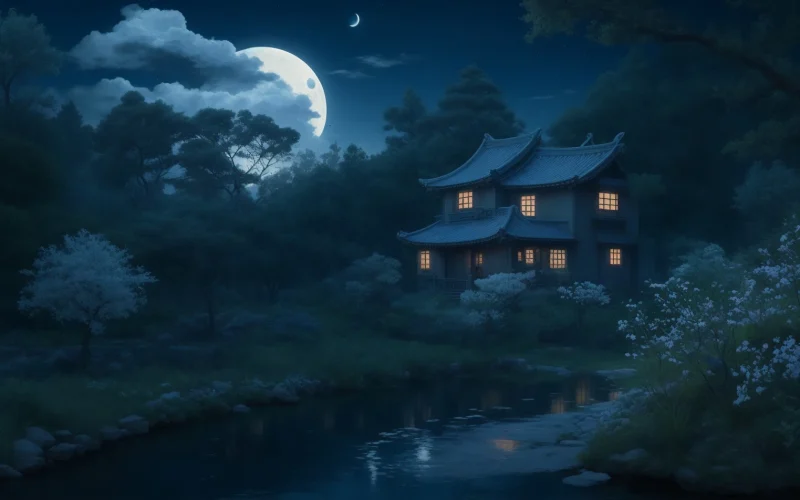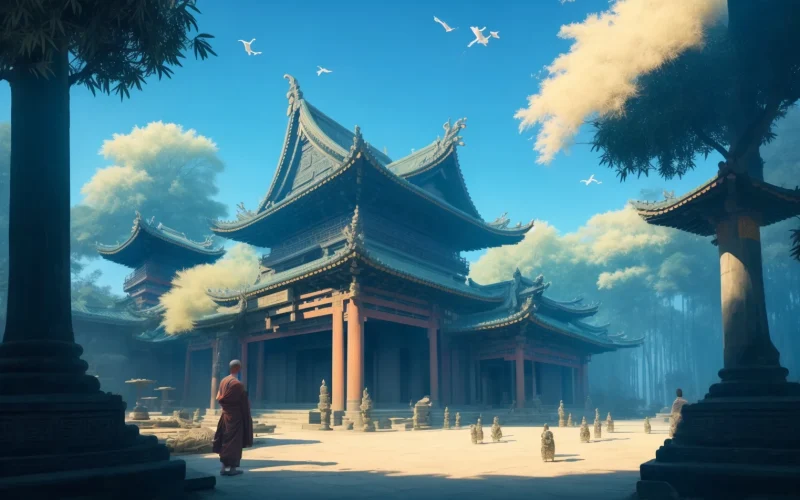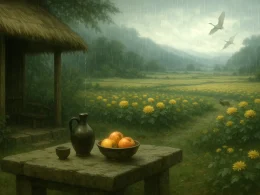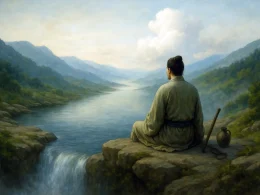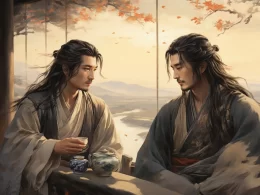Here, beside a clear deep lake,
You live accompanied by clouds;
Or soft through the pine the moon arrives
To be your own pure-hearted friend.
You rest under thatch in the shadow of your flowers,
Your dewy herbs fl.ourish in their bed of moss.
Let me leave the world. Let me alight, like you,
On your western mountain with phrenixes and cranes.
Original Poem:
「宿王昌龄隐居」
清溪深不测,隐处唯孤云。
松际露微月,清光犹为君。
茅亭宿花影,药院滋苔纹。
余亦谢时去,西山鸾鹤群。
Interpretation:
Chang Jian and Wang Changling were jinshi graduates from the same imperial examination cohort and close friends. In his early years, Wang retreated to Stone Gate Mountain (in present-day Hanshan, Anhui) - a secluded realm of mist-veiled peaks and crystalline streams that embodied the ideal hermitage. During his visit, Chang Jian immersed himself in this transcendent landscape, which inspired him to compose this poem. While celebrating Wang's reclusive life, it also voices Chang Jian's own yearning for spiritual freedom and disillusionment with bureaucratic mundanity.
Couplet I:“清溪深不测,隐处唯孤云。”
Qīng xī shēn bù cè, yǐn chù wéi gū yún.
A stream's clarity masks unfathomed depths / Lone clouds guard the hermit's mountain steps.
The opening establishes spatial paradox: the "unfathomed" (不测) stream symbolizes hidden wisdom, while "lone clouds" (孤云) visualize Wang's spiritual autonomy. This yin-yang tension between transparency and mystery frames the hermit's ethos.
Couplet II:“松际露微月,清光犹为君。”
Sōng jì lù wēi yuè, qīng guāng yóu wèi jūn.
Through pines peeks the crescent's shy grace / Its pure light exists for your face.
Personifying the moon as Wang's spiritual confidant, the verb "peeks" (露) suggests cosmic complicity. The light's exclusivity ("for you") elevates Wang's status to that of nature's chosen interlocutor.
Couplet III:“茅亭宿花影,药院滋苔纹。”
Máo tíng sù huā yǐng, yào yuàn zī tái wén.
Thatched eaves cradle blossoms' shade / Herbal courtyards nurse moss inlaid.
Tactile verbs "cradle" (宿) and "nurse" (滋) transform static scenery into a living organism. The symbiotic imagery of medicinal herbs (药) and moss (苔纹) mirrors Wang's harmonization with nature's healing rhythms.
Couplet IV:“余亦谢时去,西山鸾鹤群。”
Yú yì xiè shí qù, xī shān luán hè qún.
I too renounce this mortal sphere / For phoenix-crane realms far and clear.
The mythical luanhe (鸾鹤) transcend earthly confines, contrasting with the poem's initial geological anchors. Chang's shift from observer ("I too") to aspirant reveals his internalization of Wang's philosophy.
Holistic Appreciation
This landscape poem masterfully interweaves scenic depiction with philosophical contemplation. Through imagery of pristine waters, moonlit pines, and herbal gardens, Chang Jian constructs a liminal space where Wang's moral purity and nature's sanctity become indistinguishable. The gradual progression from objective observation ("unfathomable stream") to subjective yearning ("crane-riding life") creates a meditative arc steeped in Daoist wuwei (non-action) ideals.
Artistic Features
- Harmony of Scene and Sentiment
Natural elements (clouds/moon/moss) become vessels conveying both Wang's virtuous seclusion and the poet's spiritual aspirations. - Layered Perspective
Panoramic mountain vistas narrow to herbal courtyards before expanding into cosmic transcendence, mirroring the mind's journey from observation to enlightenment. - Lexical Transcendence
Words like "unfathomable" (深不测) and "crane-riding" (鸾鹤群) bridge tangible reality and metaphysical realms, crafting an aesthetic of purified detachment.
Insights
Beyond celebrating eremitism, the poem questions Confucian service ideals through its yin-yang contrasts: bureaucratic clamor vs. mountain stillness, political temporality vs. moss-grown eternity. It suggests true fulfillment lies not in worldly achievement but in aligning with nature's primordial rhythms - a timeless invitation to rediscover our elemental belonging.
Poem translator:
Kiang Kanghu
Chang Jian (常建, 708-765 AD), probably a native of Chang'an (now Xi'an, Shaanxi), was a poet of the Tang Dynasty. In the 15th year of the Kaiyuan era (727 AD), he was admitted to the same list as Wang Changling, but he was unhappy with his career and lived a long life of wandering in the mountains and scenic spots. Later, he moved home and lived in seclusion in Ezhu. In the middle of Tianbao, he served as a lieutenant of Xuyi. Chang Jian's surviving literary works are few, but his poem "A Buddhist Retreat behind Broken-Mountain Temple" is more famous.





